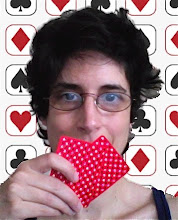You've heard this over and over: "go with your read." As I've taken a hard look at my play, one of the things I've noticed is how often I rationalize a decision I would never make if I took my read seriously. I am now trying consciously to both formulate a read (usually a hand range, but sometimes either more or less specific) AND to both refine and respect it as the hand proceeds.
Here are two cases from last night's Crime Scene Game.
#1: I am in middle position with a relatively short stack. There is a limp in early position, I limp in with 10 J suited, it folds to small blind who calls, and the big blind checks his option. The flop is J 7 5 rainbow. The small blind and big blind check, I make a half-pot bet with top pair. The small blind calls, the big blind folds.
The small blind is one of the people who runs the CSG. He is a canny player, and he knows my betting patterns better than I'd like. The check-call tells me that something about that flop appeals to him, but I don't think he's floating my bet with air or with bottom pair. It's possible he has a straight draw, but I think the most likely scenario here is that he's got a 7, he wants to see whether something will develop for his hand, and he's also keeping an eye on me to make sure that I wasn't just making a position bet with air myself.
The turn is a 10. Now I have two pair. Small blind checks. I check behind, purely as a trapping play. I'm pretty sure I'm good here, and there are very few cards that I fear on the river. I am hoping that my opponent will see my check behind as weakness. With most other players in this game I would have bet the turn, but I feel I'll be able to extract most value this way.
Except that the river is a 7. I am now not a happy camper; this is the worst possible card for me. After some hemming and hawing, the small blind goes all in (he has me covered). Is there any hand he could possibly do this with that doesn't have me beat? Even more to the point: am I persuaded that my original read was right?
I sit there for awhile, but honestly most of that time is occupied with me making my peace with the fact that I'm beat. I am totally persuaded he has a 7. I am toast: I fold. [My opponent later told me that he thought I had a straight with 89, that he shoved because he had a 7s full of 10s on the river, thought that the overbet would look weak to me and that I would call. I am inclined to believe him.]
#2: I am in the small blind. Four limpers enter the pot ahead of me. I look at my hand and find KK (red). I make a 1.5xPot bet. I get one caller, from early position. The rest fold. The caller is an action player, who plays any two, but is especially fond of and almost always chases flush draws (he's pretty keen on straight draws too, even if they're gutshots). I've also seen him shove on a flush draw if he has the Ace or the King. The flop comes 9 5 2, two spades.
I do not want him to draw to the flush. I make a pot-sized bet, which is about a quarter of his stack. Without missing a beat he shoves it all into the middle. (I have him covered.) Now what?
Well, I'm getting 4:1 on a call, I think it's likely he's on a flush draw, maybe he's got a pair as well. But there's no way I'm laying down Kings in this spot to this player. I call. He shows a set of deuces. Amazingly, I catch one of my two outs on the turn and go set over set for the win when the river blanks.
I was wrong about his holdings, that time. But now I have been reminded that he'll limp-call a big raise with a tiny pair in the hole (In fact, this behavior is endemic to the CSG and I ran into a flopped set of 3s last night too, again when I had a big hand; on that occasion I laid down my AK top pair top kicker to an all-in reraise. Me, I'm folding those small pairs to a big raise pre-flop). But I don't regret going with my read, since I think a large percentage of the time it would have been right. I am, however, unabashedly grateful for the re-suck King.
So I still believe going with my read is a good practice, especially if I am re-evaluating and testing it on every street. There's little point in HAVING a read, after all, if you don't act upon it. Unless you
are prepared to act on it, a "read" is just idle speculation, a sort of self-indulgent daydreaming. An accurate read that you base decisions upon? That, right there, is one big fundamental step towards having an edge.
Labels: cash game, hands, strategy



